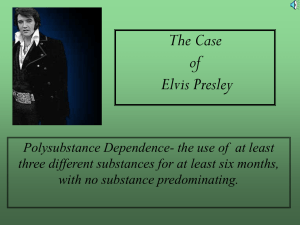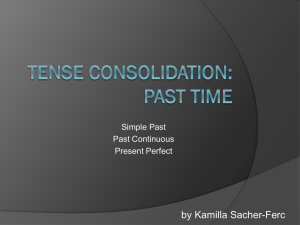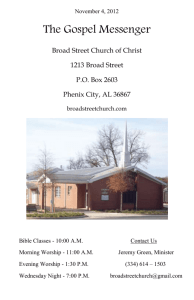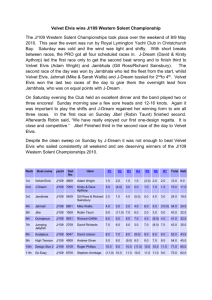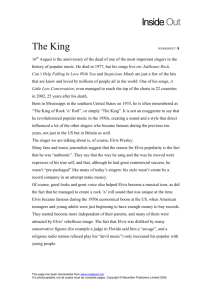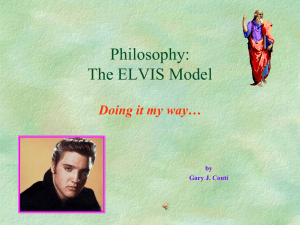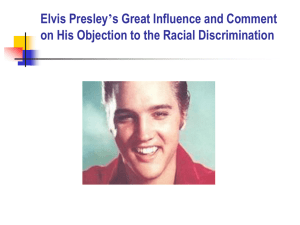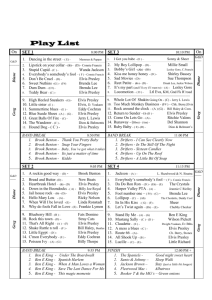Elvis.doc - Jessamine County Schools
advertisement
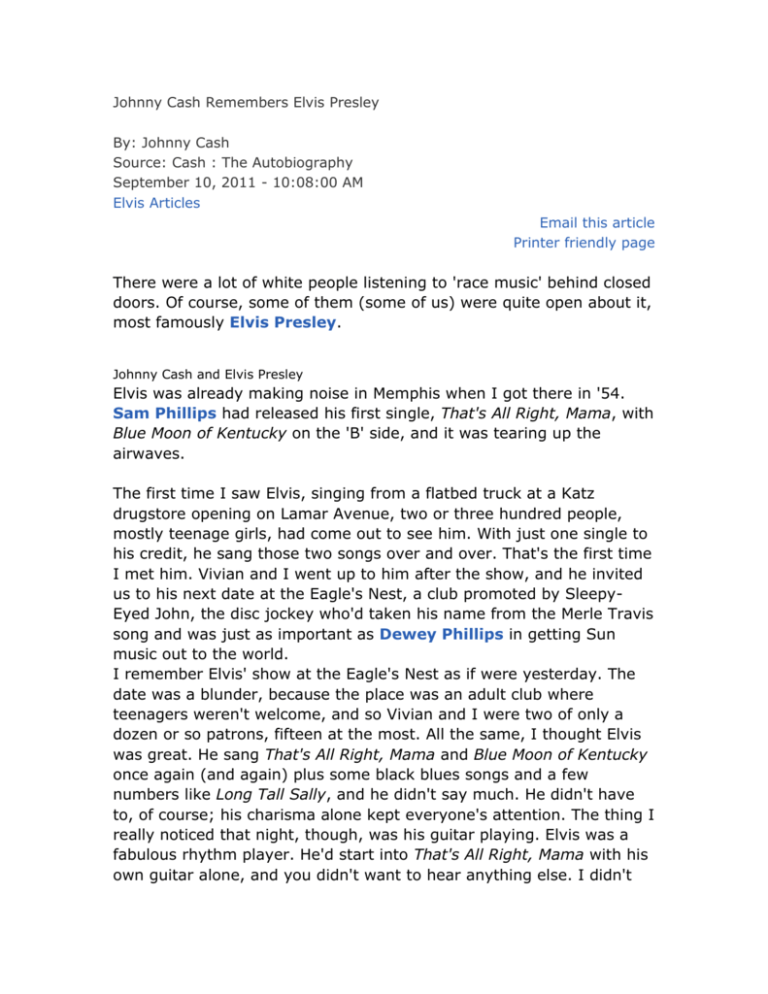
Johnny Cash Remembers Elvis Presley By: Johnny Cash Source: Cash : The Autobiography September 10, 2011 - 10:08:00 AM Elvis Articles Email this article Printer friendly page There were a lot of white people listening to 'race music' behind closed doors. Of course, some of them (some of us) were quite open about it, most famously Elvis Presley. Johnny Cash and Elvis Presley Elvis was already making noise in Memphis when I got there in '54. Sam Phillips had released his first single, That's All Right, Mama, with Blue Moon of Kentucky on the 'B' side, and it was tearing up the airwaves. The first time I saw Elvis, singing from a flatbed truck at a Katz drugstore opening on Lamar Avenue, two or three hundred people, mostly teenage girls, had come out to see him. With just one single to his credit, he sang those two songs over and over. That's the first time I met him. Vivian and I went up to him after the show, and he invited us to his next date at the Eagle's Nest, a club promoted by SleepyEyed John, the disc jockey who'd taken his name from the Merle Travis song and was just as important as Dewey Phillips in getting Sun music out to the world. I remember Elvis' show at the Eagle's Nest as if were yesterday. The date was a blunder, because the place was an adult club where teenagers weren't welcome, and so Vivian and I were two of only a dozen or so patrons, fifteen at the most. All the same, I thought Elvis was great. He sang That's All Right, Mama and Blue Moon of Kentucky once again (and again) plus some black blues songs and a few numbers like Long Tall Sally, and he didn't say much. He didn't have to, of course; his charisma alone kept everyone's attention. The thing I really noticed that night, though, was his guitar playing. Elvis was a fabulous rhythm player. He'd start into That's All Right, Mama with his own guitar alone, and you didn't want to hear anything else. I didn't anyway. I was disappointed when Scotty Moore and Bill Black jumped in and covered him up. Not that Scotty and Bill weren't perfect for him - the way he sounded with them that night was what I think of as seminal Presley, the sound I missed through all the years after he became so popular and made records full of orchestration and overproduction. I loved that clean, simple combination of Scotty, Bill, and Elvis with his acoustic guitar. You know, I've never heard or read anyone else praising Elvis as a rhythm guitar player, and after the Sun days I never heard his own guitar on his records. That night at the Eagle's Nest, I remember, he was playing a Martin and he was dressed in the latest teen fashion. I think his shirt came from the National Shirt Shop, where you could get something loud and flashy or something in a good rich black for $3.98 (I did), but perhaps by then he'd started shopping at Lansky Brothers. If he hadn't, it wasn't long before he did. I was in there myself two or three times in '55 and '56. Elvis and I talked about music, but I never spoke to him about Sun Records or any other connection into the music business. I wanted to make it on my own devices, and that's how I set about doing it. Elvis certainly took a lot of abuse from that crowd. He had his problems with gossip, too, and rumor and lies. He was very sensitive, easily hurt by the stories people told about him being on dope and so on. I myself couldn't understand why people wanted to say that back in the '50s, because in those days he was the last person on earth who needed dope. He had such a high energy level that it seemed he never stopped - though maybe that's why they said he was on dope. Either way, he wasn't, or at least I never saw any evidence of it. I never saw him use any kind of drug, or even alcohol; he was always clear-headed around me, and very pleasant. Elvis was such a nice guy, and so talented and charismatic - he had it all - that some people just couldn't handle it and reacted with jealousy. It's only human, I suppose, but it's sad. He and I liked each other, but we weren't that tight - I was older than he was, for one thing, and married, for another - and we weren't close at all in his later years. I took the hint when he closed his world around him; I didn't try to invade his privacy. I'm so glad I didn't, either, because so many of his old friends were embarrassed so badly when they were turned away at Graceland. In the '60s and '70s he and I chatted on the phone a couple of times and swapped notes now and again. If he were closing at the Las Vegas Hilton as I was getting ready to open, he'd wish me luck, that kind of thing - but that was about the extent of it. I've heard it said that here at the end of the century, we all have our own Elvis, and I can appreciate that idea, even though my Elvis was my friend, flesh and blood in real life. Certainly, though, my Elvis was the Elvis of the '50s. He was a kid when I worked with him. He was nineteen years old, and he loved cheeseburgers, girls, and his mother, not necessarily in that order (it was more like his mother, then girls, then cheeseburgers). Personally, I liked cheeseburgers and I had nothing against his mother, but the girls were the thing. He had so many girls after him that whenever he was working with us, there were always plenty left over. We had a lot of fun. We had a lot of fun in general, not just with the girls. It was nice that we could make a living at it, but every one of us would have done it for free. And you know, Elvis was so good. Every show I did with him, I never missed the chance to stand in the wings and watch. We all did. He was that charismatic. Carl Perkins Which is not to say that he always blew everyone else away. I distinctly remember, for instance, one night in Amory, Mississippi, when he had to take a backseat to Carl Perkins, even though he was the headliner. At the time Carl hadn't yet had his big hit, but he'd had Movie Mag, he'd played the venue several times before on his own, and they loved him. He went on first and tore the place up; the fans went absolutely nuts. When Elvis went on, he got a fabulous reception too, but he wasn't all the way through his song when half the audience started shouting for Carl. It was so bad that he only did one more song before giving up. He left the stage and Carl came back on to thunderous applause. I heard later that after that night in Amory, Elvis said he'd never work with Carl again. I didn't hear him say it myself, and to me it doesn't sound like Elvis - he wasn't that small-minded but that's what some people passed along, and it's certainly true that Carl stole his show. I went up to Carl after the show. 'You did really good tonight, Carl', I said. 'I've been to Elvis' shows and I've done a couple of them with him myself, and I'll tell you, I never thought I'd see anyone outshine him'. 'Yeah', he replied, 'but there's one thing missing'. 'What's that?' 'He's got a hit record, and I don't'. Blue Suede Shoes There was no arguing with that, and it got me thinking. A little while later that night, I told Carl about C.V. White and the blue suede shoes. C.V. White was a black airman from Virginia I'd known in Landsberg he told us the initials stood for 'Champagne Velvet', but none of us ever knew the truth - and one night he said this one thing that really struck me. When we got a three day pass we'd get out our best uniforms, polish our brass, and spit-shine our shoes. C.V. would come by and say, 'How do I look, man?' 'Like a million dollars', I'd tell him, and it was true. 'You look great, C.V. You look really striking'. One night he laid the line on me at that point. 'Well' he said, 'just don't step on my blue suede shoes!' 'They're not blue suede, C.V. They're air force black, like everyone else's'. 'No , man. Tonight they're blue suede. Don't step on 'em!' I told Carl that story and how I'd thought it had a song in it, and he took it and ran with it. He didn't record it the way I'd been thinking. My idea had been to adapt a melody from a nursery rhyme (taking a leaf out of Jack Clement's book), but I'd say Carl's version worked out pretty well. Elvis And Carl Perkins A lot has been made over the years of a rivalry between Carl and Elvis, and of course the story of Blue Suede Shoes does lend itself to that interpretation. According to the story, after Carl was put out of action by a terrible car crash while his hit was riding up the charts, Elvis recorded it himself and capitalized on Carl's success. It's one of those 'What If' questions. If Carl had been able to ride the wave of Blue Suede Shoes all the way and follow up on it properly, could he have become as big a star as Elvis, or even bigger? I don't think so. I believe that without the accident Carl could have become a real superstar in the pop/rockabilly world. However, neither he nor anyone else could have become the star Elvis was. Ain't nobody like Elvis. Never was. The Million Dollar Quartet There's certainly a sense that Carl Perkins stands in the shadow of Elvis, Jerry Lee, and me. You can see when people talk or write about the so-called Million-Dollar Quartet session, the only time to my knowledge that all four of us sang together. Somehow Carl's name always seems to come last in the list of participants, but in fact it was his session that day. The Million Dollar Quartet - December 4, 1956 Nobody else was booked into the studio. I was there - I was the first to arrive and the last to leave, contrary to what has been written. I was just there to watch Carl record, which he did until mid-afternoon, when Elvis came in with his girlfriend. At that point the session stopped and we all started laughing and cutting up together. Then Elvis sat down at the piano, and we started singing gospel songs we all knew, then some Bill Monroe songs. Elvis wanted to hear songs Bill had written besides Blue Moon of Kentucky, and I knew the whole repertoire. So, again contrary to what some people have written, my voice is on the tape. It's not obvious, because I was farthest away from the mike and I was singing a lot higher than I usually did in order to stay in key with Elvis, but I guarantee you, I'm there. I forget exactly when Jerry Lee came in, but I remember clearly when Elvis invited him to take over at the piano and he launched into Vacation in Heaven. That was the first time I ever heard Jerry Lee, and I was bowled over. He was so great that the next thing I remember, Elvis and his girlfriend were gone. The thing I remember after that, apart from going next door for coffee and cheeseburgers, is seeing the now famous 'Million-Dollar Quartet' photo in the Memphis Commercial Appeal and wondering what happened to Elvis' girlfriend. She'd been sitting on the piano when the photo was taken. If you're wondering why Elvis left right after Jerry Lee got started, the answer is simple: nobody, not even Elvis, ever wanted to follow Jerry Lee. And no, I don't remember Jerry Lee ever saying anything disparaging about Elvis. He didn't have an attitude about Elvis especially; he just had an attitude. Source: Johnny Cash: The Autobiography.1997 by John R. Cash John Carter Cash: Throughout my life, I would see Mom get a mischievous twinkle in her eye whenever she mentioned Elvis Presley. Her eyes would flash merrily, and she would say, 'you know, son, your father was always jealous of Elvis'. She even told me once that she sometimes wondered what would havew happened if she had fallen in love with Elvis. Mom and Elvis occasionally toured together, along with other performers, sometimes including Mother Maybelline and one or more of June's sisters. The Carter's were friends of Elvis, and there are stories about Mother Maybelline sewing buttons on Elvis' shirts when they popped off during his wild onstage gyrations. Though Mom always maintained that she never had an affair with Elvis, Carl [her first husband] believed differently and perhaps for good reason. After Carl moved out of their Madison home, Mom would sometimes let Elvis stay at the house to 'rest' after a tour. - From the biography: 'Anchored In Love: An Intimate Portrait of June Carter Cash'. Written by John Carter Cash, the son of Johnny and June Carter Cash. While at Sun, Cash also wrote You're My Baby for Roy Orbison and Get Rhythm for Elvis Presley, though Cash described how, when Sam Phillips sold his interest in Presley to RCA, he wouldn't allow Elvis to take Get Rhythm with him, and put it on the B side of Cash's I Walk The Line instead. 'The Elvis I knew was a kid full of fun', said Cash. 'He loved his work, loved his music, loved his guitar, loved gospel music and loved his mother'. About Johnny Cash Johnny Cash was one of the most imposing and influential figures in post-World War II country music. With his deep, resonant baritone and spare, percussive guitar, he had a basic, distinctive sound. Cash didn't sound like Nashville, nor did he sound like honky tonk or rock & roll. He created his own subgenre, falling halfway between the blunt emotional honesty of folk, the rebelliousness of rock & roll, and the world weariness of country. Cash's career coincided with the birth of rock & roll, and his rebellious attitude and simple, direct musical attack shared a lot of similarities with rock. However, there was a deep sense of history -- as he would later illustrate with his series of historical albums -- that kept him forever tied with country. And he was one of country music's biggest stars of the '50s and '60s, scoring well over 100 hit singles. Like Elvis, Johnny Cash started with Sun Records and its founder, Sam Phillips, in 1955. (Elvis in 1954) Johnny Cash Wasn't There When you consider the ramifications of this article and statement from Kris Kristofferson, you really have to conclude Johnny Cash was not at the Million Dollar Quartet Session as he claimed to be. Kris Kristofferson Clears Up Stories About Helicopter Visit To Johnny Cash . Grizzled country star Kris Kristofferson has exploded a music myth surrounding a helicopter visit he made to Johnny Cash, insisting it wasn't quite like the Man in Black remembered it. For starters, Cash and his wife June Carter weren't at home when he touched down on their sprawling Tennessee property in an effort to hand a demo to his hero. Kristofferson, a one-time Army helicopter pilot, was working for an oil firm when he decided to pay Cash a visit and though he admits he did make the trip to the late country legend's home, he insists the rest of the tale is more than a little embellished. He tells Cowboys & Indians magazine, 'I think he told the story that I got out the helicopter with a beer in one hand and a tape in the other. But he wasn't even in the house'. 'And I never would have been drinking while flying a helicopter'. And even June Carter's account of a fictitious first meeting with Kristofferson was over the top - she once told reporters she feared the Me & Bobby MCGee singer was there to arrest her husband. Kristofferson says, 'She wasn't there either'. 'But, you know what, I never was going to contradict either one of them'.
